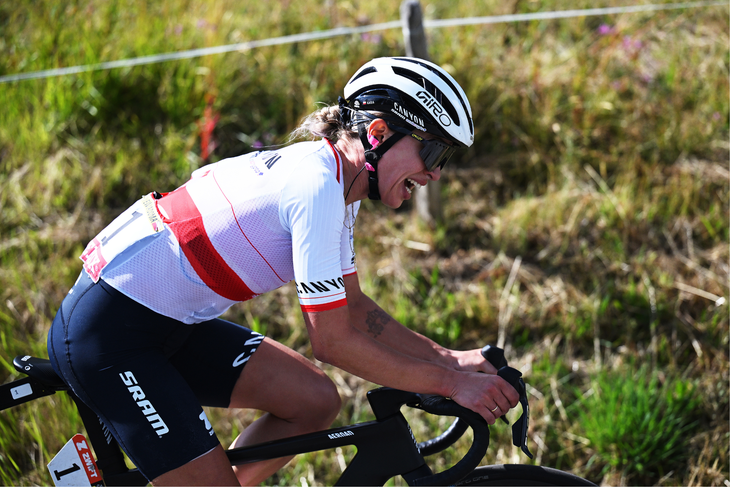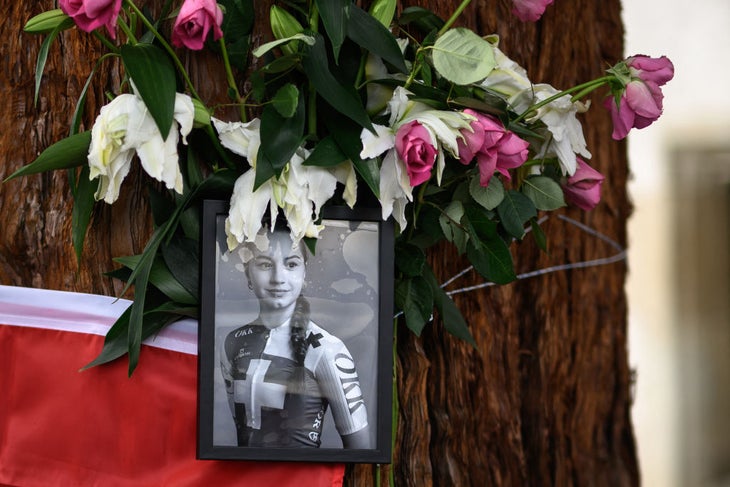Controversy broke out at the Tour de Romandie Féminin on Friday after the UCI has disqualified five teams from the race.
The decision was taken prior to the start of Friday’s stage one of the WorldTour race, an individual time trial.
WorldTour teams Canyon-SRAM Zondacrypto, Lidl –Trek, Team Picnic PostNL, Team Visma Lease a Bike and ProTeam EF Education – Oatly were those blocked from starting, meaning riders such as Kasia Niewiadoma, Antonia Niedermaier, Marta Cavalli, Niamh Fisher-Black, Veronica Ewers, Magdeleine Vallieres were all affected.
In a statement released by the UCI on Friday, it said that the teams had “refused to comply with the rules for the race related to the implementation of GPS trackers as a test for a new safety system.”
It said that the test details were communicated on August 7 and also in a pre-race communiqué.
“The test involves one rider per team carrying a GPS tracking device, weighing 63 grams, during the three stages (15-17 August) of the Swiss UCI Women’s WorldTour stage race,” it said Friday.
“As communicated in the specific rules for the event and in accordance with articles 1.3.073 and 2.12.007/3.5.3 of the UCI Regulations, teams were required to designate one rider on whose bike the GPS tracker would be fixed. Teams were given further explanations during the sport directors pre-event meeting.
“The UCI regrets that certain teams have objected to the test by not nominating a rider to carry the tracking device and have therewith opted to be excluded from the Tour de Romandie Féminin. In view of this situation, the UCI shall consider if other measures are warranted in accordance with the UCI Regulations.”
In response the teams concerned each issued a mutual statement, entitled “UCI fails to confirm rule clarification request despite teams tracking system co-operation.”
In it the teams said they were “shocked and disappointed” by their disqualification, and gave the reasons for their dissatisfaction with what was proposed.
“Earlier this week, all affected teams sent formal letters to the UCI expressing support for rider safety but raising serious concerns about the unilateral imposition of a GPS tracking device to just one of the riders per team,” they wrote.
“We made clear that we would not select a rider ourselves, nor install, remove, or maintain the device [and] the UCI or its partner was free to select a rider and install the device at their own liability if they believe they are in their right to do so.
“Despite our cooperation and the existence of a proven and collaborative safety tracking system already tested successfully in other major races (fully operational for the whole peloton and offered to the UCI), the UCI has chosen to impose this measure without clear consent, threaten disqualification, and now exclude us from the race for not selecting a rider ourselves. The reason why they don’t want to nominate a rider themselves is still unknown and unanswered.”
In its statement on Friday announcing the disqualifications, the UCI appeared to imply that there may be another factor in the deadlock.
“It should be noted that most of these teams are part of the Velon organisation which is the owner of its own data transmission system and is working on the development of its own GPS tracking system.”
Teams accuse UCI of coercion

The controversy looks set to simmer on, judging by the tone of the teams’ statement plus the threat of possible further action by the UCI.
That statement was critical of the governing body in terms of what it said was a lack of dialogue.
“Despite multiple requests by the teams over the last two days, the UCI commissaires were unable to demonstrate on the basis of which precise UCI rule teams are obligated to discriminate one rider against other riders in terms of obligations (except for officially referring to an email of the teams’ union) but have nevertheless decided to carry on and disqualify the teams with their riders,” the statement said.
“This action disregards the rights of teams and riders, applies the measure in a discriminatory manner, and contradicts the UCI’s own stated commitment to dialogue with stakeholders.
“We are always at the forefront to make cycling a safer sport, but it should be achieved through collaboration, not coercion.”
Background to the controversy

GPS trackers were used in both the men’s and women’s Tour de Suisse races in June. They were introduced following the tragic death of Muriel Fürrer at last year’s world road championships in Zürich. The young Swiss woman crashed during the junior women’s road race and lay undiscovered for more than an hour, dying the following day from her injuries.
Professional riders’ association CPA president Adam Hansen previously told Velo that neither race organizers nor race commissaires noticed that Gino Mäder had crashed during the 2023 Tour de Suisse, nor that Andre Drege had also gone off the road in the 2024 Tour of Austria.
Like Furrer, both riders died as a result of their injuries.
Hansen called for the introduction of GPS trackers as a result.
Speaking about the technology, the UCI said in its statement on Friday that the decision to use such trackers at the Tour de Romandie Féminin was made by SafeR, a group of cycling’s stakeholders aiming to improve safety.
“The objective of the test is to refine the UCI’s safety tracking software and establish protocols to provide real-time data to race control, medical teams and UCI Commissaires,” it wrote.
The UCI added that the system was developed by Swiss Timing, its official timing partner. It said that it would both strengthen the monitoring of rider safety during races and also enable rapid response in case of incidents.
It said that it plans to use the same technology at the UCI world road championships in Kigali, Rwanda, and that all riders will use the devices. It also said that it planned “broader implementation of this technology” in future seasons.
A simmering war of words

It emerged Friday that CEOs of the five disqualified teams plus that of AG Insurance-Soudal had sent a letter to the UCI’s Strategic Sports Manager.
Cyclingnews reported the letter and quoted excerpts from it, with the teams stating they are fully supportive of the SafeR project, including the successful testing at the Tour de Suisse events. It said that all stakeholders gave their consent and collaboration, and that the UCI was given full access to the test.
However the teams have taken issue with what it said was the UCI’s decision to take “it upon itself to seek to impose on-bike tracking under the banner of ‘safety’ for the benefit of the UCI’s World Championship, a race owned, organised and commercialised by the UCI.”
The teams insisted that the right to mount such devices on riders’ bikes remains with the teams, and requires their “consent and close collaboration.” It blasted Friday’s disqualifications as “grossly unfair.”
The tension looks set to rumble on: in its statement Friday, the UCI claims its priority is the safety of riders, and said that the collaboration with most stakeholders “is positive and constructive.”
It blasted the five teams in question.
“It is deplorable to witness the refusal of certain teams to move forward together to protect the safety of riders, and the UCI condemns their non-cooperation.”
